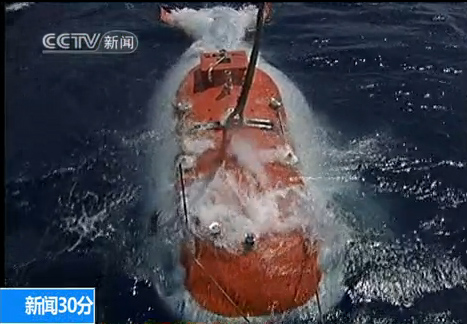Society
China succeeds in manned dive to over 3,700 meters
(Xinhua)
Updated: 2010-08-26 20:49
 |
Large Medium Small |
|
 |
|
The submersible dubbed "Jiaolong" falls into water in this video grab from China Central Television, Aug 26, 2010.
|
It makes China the fifth country, following the United States, France, Russia and Japan, to have the technologies for a manned dive to more than 3,500 meters below sea level, the two authorities announced at a press conference.
The submersible, dubbed "Jiaolong," completed 17 dives in the South China Sea from May 31 to July 18, with the deepest reaching 3,759 meters and with three crew on board, the SOA said in a report.
"We went through strict selection and training procedures before we managed to get on board the submersible," said Ye Cong, one of the crew on board.
"The submersible is very convenient to manoeuvre and we operated it quite well under the water," he said.
"I think we've only achieved initial success in the test. The future application of the vessel will be more remarkable than this test," he said.
It also set a record by operating underwater for nine hours and three minutes, the SOA report said.
The average ocean depth is 3,682 meters below sea level.
A submersible differs from a submarine as it typically depends on another vessel or facility for support.
"As the first manned vehicle designed to reach 7,000 meters below sea level in the world, the submersible can be used in 99.8 percent of the world's sea areas," said chief designer, Xu Qinan.
"It represents the most advanced technology in deep-sea exploration," he said.
So far, manned submersibles could only descend to 6,500 meters below sea level.
"Each part of the submersible has passed the pressure test of 7,000 meters, and their performance will be tested again in the future as we'll carry out 5,000-meter and 7,000-meter tests," Xu said.
China began to work on the ambitious ocean exploration program in 2002. About 100 research institutes and companies were involved in the program.
The development of the submersible and its support vessel, as well as the selection and training of the crew took six years, and initial tests began in August last year, according to the SOA.
At the press conference, Vice Minister of Science and Technology Wang Weizhong said: "The just completed test sufficiently proved various capabilities of the submersible and laid a solid foundation for its practical application in resource surveys and scientific research as well as for deeper tests."
The submersible could carry a crew of up to three people, and would play an important role in the deep-sea exploration of natural resources and polar research, according to the SOA.
It would be equipped for deep-sea natural resources inspections, as well as research and tests of equipment designed for deep-sea use, the SOA said.